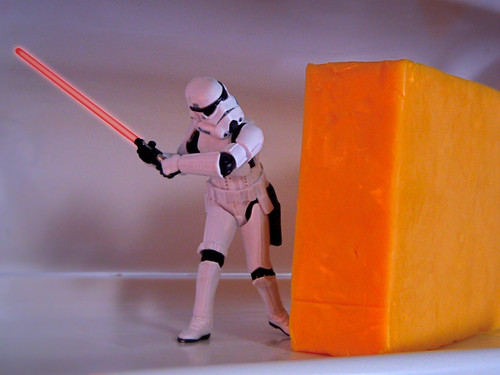Welcome to Word Buzz Wednesday, in which we round up our favorite buzzworthy words of the week. The latest: camembert killers; an indecisive eponym; and a deadly stew.
fromagicide
“In one incident that Russian news source RT calls ‘fromagicide,’ some 9 tons of European cheeses were steamrolled and bulldozed before being buried at a landfill.”
Bill Chappell, “We Will Bury You: Russia Bulldozes Tons Of European Cheese, Other Banned Food,” NPR, August 6, 2015
Last year in response to economic sanctions from the U.S. and some European countries, Russia banned the import of Western agricultural products, including cheese, tons of which the country recently destroyed, leading to the term fromagicide, the death of cheese.
Fromage, French for cheese, ultimately comes from the Latin forma, “shape, form, mold,” while the –cide suffix means “killer.”
Goldilocks zone
“The habitable zone, sometimes referred to as the ‘Goldilocks Zone,’ is the region around a star that has just the right conditions to find liquid water on a planet’s surface.”
Amy Thompson, “A super-Earth found in the habitable zone of a Sun-like star,” Ars Technica, July 23, 2015
It’s not enough that Goldilocks breaks into the bears’ house, she has to have all things just right, whether porridge temperature, chair size, or bed comfiness.
merkeln
“Compilers of the German dictionary Langenscheidt say that ‘merkeln’ is likely to be named the most popular youth word of the year in its national poll.”
Sean O’Grady, “Angela Merkel has inspired a new German word – so which British politicians could lend themselves to our lexicon?” The Independent, August 6, 2015
To merkel, or merkeln in German, means to be “indecisive or not to have an opinion at all.” This neologism comes from Angela Merkel, Chancellor of Germany, who has been criticized for “her procrastination over issues such as Greece and nuclear power.”
(H/t Barry Popkik)
Soudelor
“While the island continues to be drenched by heavy rains, the worst of the winds have passed and Soudelor is now churning across the sea toward mainland China.”
Faith Karimi, Laura Smith-Spark and Steve Almasy, “Typhoon Soudelor drenches Taiwan, churns on toward China,” CNN, August 8, 2015
Soudelor comes from a Pohnpeian word meaning “legendary chief or ruler,” where sau means “entitled to” and deleur is an obsolete name for Pohnpei, an island of Micronesia.
toxic gumbo
“Entire neighborhoods were deserted or submerged, and the water had turned black, a noxious mix of dirt, sewage, and gasoline the media dubbed ‘toxic gumbo.’”
David Grimm, “How Hurricane Katrina Turned Pets Into People,” BuzzFeed, July 31, 2015
Toxic gumbo is an ironic play on gumbo, the signature okra-thickened stew of Louisiana and nearby states.
The word gumbo, which is West African in origin, first referred to the okra plants themselves. It’s also come to mean a French patois spoken by “some Black people and Creoles in Louisiana and the French West Indies,” as well as “a fine silty soil, common in the southern and western United States, that forms an unusually sticky mud when wet.”
As for the term toxic gumbo, that has actually been in use since well before Hurricane Katrina ravaged the Gulf Coast in 2005. The earliest citation we could find was from a 1991 article in People magazine:
In 1989 these companies discharged 124.4 million pounds of toxic chemicals, including the carcinogens vinyl chloride and benzene, as well as ammonia and mercury, which affect the nervous system, and chloroform, toluene and carbon tetrachloride, which can deform fetuses. “We call it toxic gumbo,” says Ramona Stevens, another local activist.
